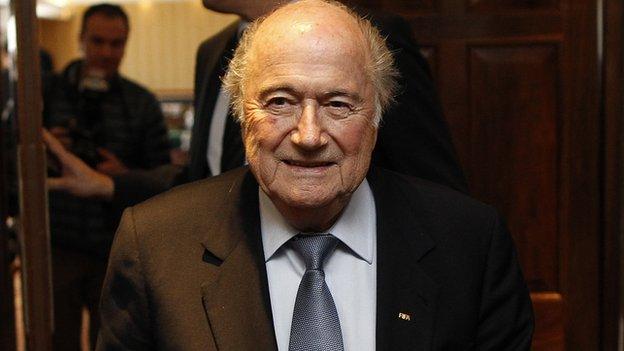Fifa: Who can fix football’s governing body?
- Published
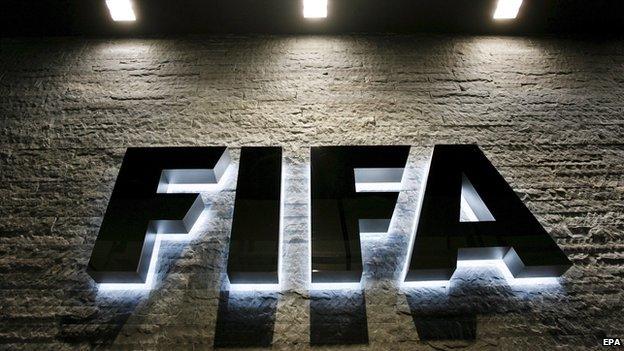
The arrest of several high-ranking Fifa officials in an investigation into alleged corruption, has put world football's governing body under renewed scrutiny.
Fifa has been described as a "totalitarian" set-up "beyond ridicule". A corruption report is said to have contained "numerous materially incomplete and erroneous representations".
Sepp Blatter, who has been president since 1998, is still favourite to win his fifth four-year term this weekend, despite saying in 2011 that he would stand down in 2015, external.
Fifa plans to go ahead with the presidential elections despite the arrests. So what does the future hold for the controversial organisation?
Five expert witnesses offer their insights to the BBC World Service Inquiry programme.

Sue Bridgewater: Football is priceless to marketers and broadcasters
Sue Bridgewater is director of sport at Liverpool University.
"Football is a global sport. It has immense following and very strong emotional engagement with its fans.
"It is increasingly difficult for marketers to get their message across - current generations are rather bored with advertising, and we've all got very good in the digital age of skipping adverts.
"So they have to find other ways of communicating their messages. Sponsorship is a good one - not least because the younger male audience is notoriously difficult for marketers to actually get in touch with."
Sponsorship now makes up around a quarter of Fifa's revenue for the World Cup, giving those sponsors great potential power.
"They have a voice, and they can use that voice to influence if they choose to. Obviously if you are sponsoring something where there's any possibility that what you're sponsoring could actually have a 'negative halo effect' rather than a positive one, you would be concerned about it as a sponsor."
"[However] if you are a commercial broadcaster then the advertising that might be associated with showing those matches is going to be a very big draw for broadcasters. It will be a very bold decision to not be involved in a World Cup tournament as a broadcaster.
"The will to reform Fifa has to come from within Fifa."

Alan Tomlinson: Uefa could break away from Fifa if it wanted
Alan Tomlinson is professor of leisure studies at the University of Brighton. He argues Uefa - the body that governs European football, and the most powerful of the regional confederations within Fifa - could force its parent body to change.
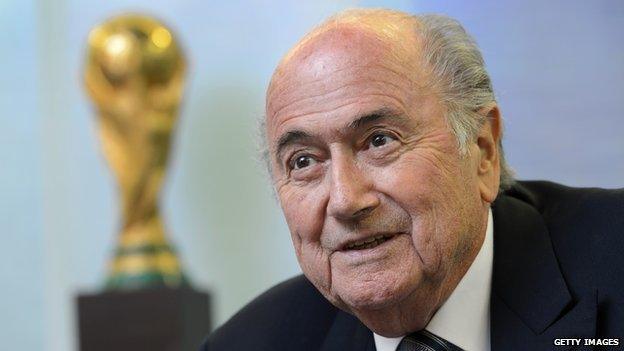
Sepp Blatter is standing for re-election as Fifa president despite promising to stand down
"I could imagine it causing a tremor in the bunker of the Fifa executive committee.
"A Fifa without the most revered individual players and the most glamorous and rich clubs in the world would not be able to make the same sorts of claims about what it represents.
"There would be fights over player availability. It would be a traumatic split.
"Uefa could seek to mobilise its members. It has a serious product itself, the Champions League. Uefa's members have the top four or five national leagues in the world. It could leave and set up some alternative.
"But it couldn't rival the magic of the full World Cup with 209 associations, and the history and the romance of the World Cup since 1930 would be torn to shreds. But Uefa could - if it were absolutely serious - pull out.
"[But] there aren't, as far as I've heard, any serious voices around or within Uefa committed to that prospect. It's more likely that what Uefa really wants to do is find someone from within its own make-up to get into the top of Fifa.
"It would have to have a new president to change."

Roland Buechel: External pressure will force change
Roland Buechel, is Swiss MP who has pioneered changes in Swiss law to force Fifa to clean up its act. He wrote an open letter to Fifa president Sepp Blatter in 2011, calling on him to "clean up your house" after Russia and Qatar were chosen to host the 2018 and 2022 World Cup finals, external.
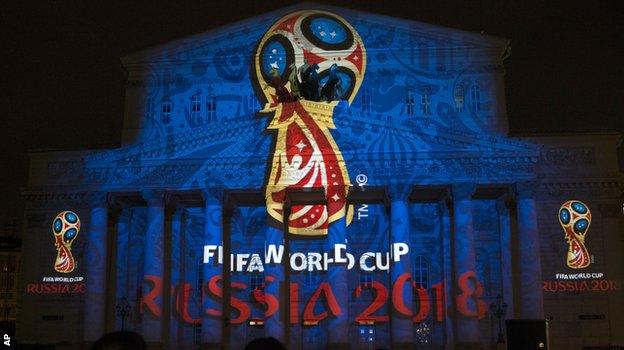
The official logo for the 2018 World Cup is shown off on the facade of the Bolshoi Theatre in Moscow
"Fifa and the other sports federations became a harm to the reputation of my country. I was fed up with that.
"People thought that it would not be possible to change a sports federation, and people laughed at me because many of them didn't see the problem as big as it is.
"Fifa is registered like a normal association. It's just the same status as a yodelling association in a mountain village, and that's not the correct way to be registered for a billion dollar company. They are accountable in a much lighter way than a company of the same size would be.
"They don't have to declare the salaries of the president, they don't have to say how much they spend or give in bonuses."
At the end of last year, he got enough support to help push through a new law, changing the status of sports officials in Switzerland. They're now "politically exposed persons".
"If a sports official puts 30,000 Swiss Francs into his account in cash, this will have to be reported to the authorities and so it means that no bribery money will be directed through Switzerland anymore. They will have to find completely different ways of paying the bribes if they want to carry on with that."
There is a second piece of legislation up for debate in June which, if passed, will make private corruption a criminal offence:
"Private corruption will become an official crime. If the public prosecutor knows of a case, he will have to step in, so it will be a huge change in law and - in the end - in the behaviour of sports officials.
"I think Fifa are quite worried because they have now started to do extremely strong lobbying. Three or four years ago they were quite amateurish.
"[Now] they have their own people lobbying in parliament. They really try hard and with a lot of money to influence parliament.
"This is a big turning point for Fifa. Mr Blatter hasn't changed enough, and now with this pressure from the outside, he must change things and I am absolutely convinced that this helps football.
"The change must come from within Fifa."

Mark Pieth: Don't underestimate the challenge of reform
Professor Mark Pieth is an expert on bribery and corruption. In 2011 Sepp Blatter asked him to chair a new Independent Governance Committee (IGC), external within Fifa. As a result, in 2012 Fifa set up a new two-chamber ethics committee - with an investigative arm led by a prosecutor, and a judicial one led by a judge - as well as a new Audit and Compliance Committee.
"I underestimated the challenge. We were caught up in a lot of infighting. Most of them are happy to reform on paper, but to actually change their attitude, that's a different matter."
When the ethics committee investigated alleged corruption by the winning Russia and Qatar World Cup bids, the head of one part accused the head of the other of misrepresenting his investigation - and resigned in protest.
"[The two parts] were too independent. They were doing exactly what they thought was right, and acting like loose cannons. They had a cross-cultural difficulty. You have on the one hand a very politically-thinking US ex-attorney, and on the other, a very straight Bavarian judge and the two just didn't harmonise."
But Professor Pieth was pleased his proposed audit and compliance committee was established:
"[The people on it] can walk into every room, open every cupboard, walk into every committee, so it's much more difficult to shift packages of money around.
"There are some very blatant aspects [of corruption]. In 2011 you had people who were ready simply to sell their votes. Now, there are much more elaborate ways of patronage and the integrity committee has actually over time found out that some of the old hands have been taking millions and they had to leave."
But these committees represent the limit of the reform he could achieve:
"They realised that things were getting serious when we started talking terms of office or integrity checks for newcomers, then they started balking."
Fifa also rejected his suggestion to publish executive pay:
"They would have to stand up and say, 'I have nothing to hide, it's about transparency, and by the way, I'm starting with myself'. I suggested this to Mr Blatter: 'Why don't you shock all your critics? Stand up and say what's the big fuss about? I'm earning this or that'.
"He said, 'Well, it's not a bad idea, but frankly I don't want to do this alone. I would like to do it together with the entire executive committee,' so it's like standing around the swimming pool and nobody dares to jump in.
"I asked Mr Blatter at the very beginning, 'Why are you doing this? You've been living happily before.' And he said: 'Well, I want to leave the house through the front door.' Now, I would have respected it if he had left, but somehow running again now counteracts what he's been saying.
"People are afraid of losing power."

Walter de Gregorio: Reform process has hurt
Walter de Gregorio is Fifa's director of communications.
"In the last four years we tried to strengthen and to improve good governance. I think the biggest achievement was the two chambers of the ethics committee.
"There were about 40 recommendations from the IGC. Most of them - I think 37 or 38 - were accepted. The reform process was a hard process; it did hurt but it is necessary and has to go on.
"In Switzerland it's a different mentality [about publishing pay]. If you live in the US, after the second coffee you tell what you make a year. In Switzerland people see this private; people don't talk about their salaries.
"I would be very honoured to tell you how much I make because I think I earn every penny. [But] I can't tell you because it's also solidarity. I cannot be the first one who tells you how much I make."
Mr de Gregorio rejects the idea that a new president is the simple solution to Fifa's problems:
"You have a structural problem where you have the president elected by one body - namely the congress - and you have his ministers, like his government. elected by another body - namely by six different confederations.
"So basically his government is a group of people representing the interests of their own confederation so you tell me now how a president has to deal with that?"
The Inquiry is broadcast on the BBC World Service on Tuesdays from 12:05 GMT/13:05 BST. Listen online or download the podcast.
- Published27 May 2015
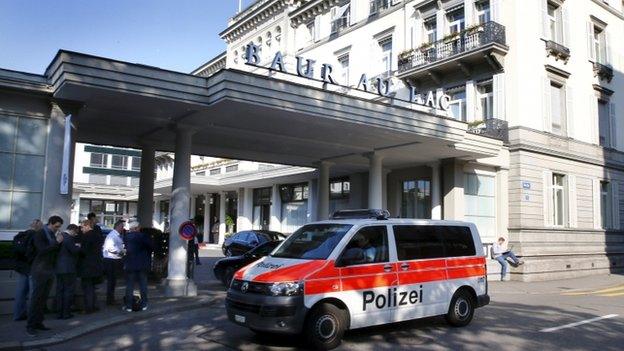
- Attribution
- Published25 May 2015
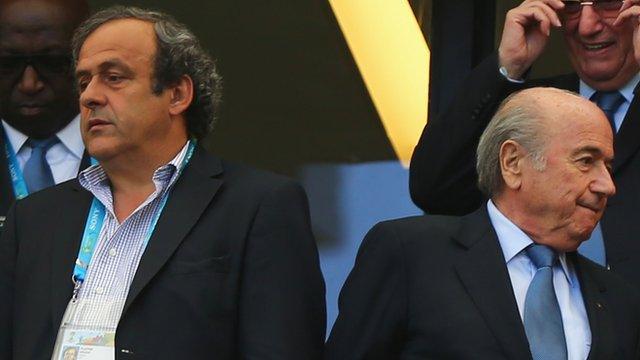
- Attribution
- Published21 May 2015
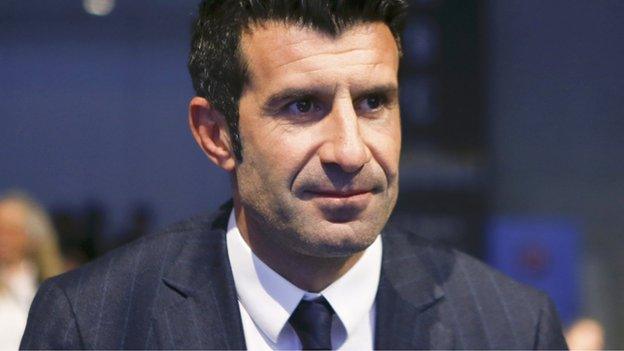
- Published18 May 2015

- Attribution
- Published15 May 2015
